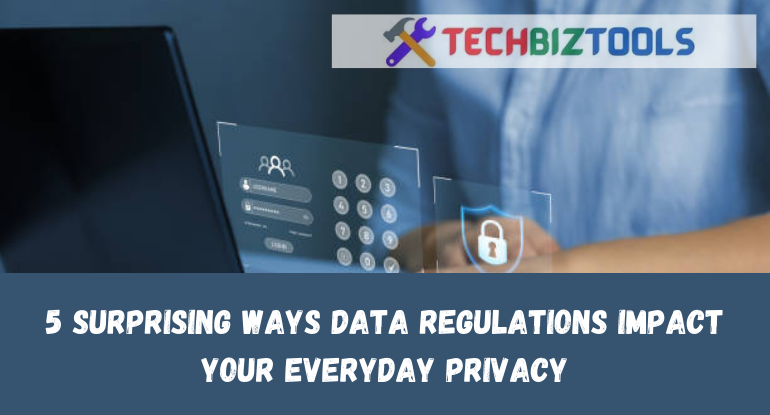
5 Surprising Ways Data Regulations Impact Your Everyday Privacy
Data regulations are crucial for how our personal information is gathered and protected. While people generally understand their purpose, these rules have surprising effects on our daily privacy.
They go beyond laws, influencing the ads we see, the security of our transactions, and even the technology we use, all while maintaining a balance between innovation and protecting our data.
5 Surprising Ways Data Regulations Impact Your Everyday Privacy

Data regulations wield influence over aspects of our lives that might initially seem unrelated to privacy concerns.
Here are five surprising ways these regulations impact our daily privacy, spanning from everyday routines to deeper facets of our existence:
#1. Grocery Store Loyalty Programs
Grocery store loyalty programs often seem to have an uncanny ability to anticipate our shopping needs, almost like a personalized shopping assistant. These programs work by keeping tabs on what we buy, aiming to tailor discounts and promotions based on our preferences.
However, the intricate web of data regulations steps in here. These regulations, designed to safeguard our privacy, impose limits on how much information can be collected and utilized by these programs.
As a result, retailers find themselves in a delicate balancing act. They strive to maintain the personalized shopping experience that customers value while adhering to the strict guidelines outlined in data privacy laws.
This balance can lead to noticeable adjustments in the nature and frequency of the offers we receive. You might observe changes in the types of discounts offered or the frequency with which personalized promotions appear in your inbox or at the checkout.
These adjustments aren't just random shifts; they stem from a conscientious effort by retailers to align their practices with legal requirements, ensuring that they respect customers' privacy boundaries while still offering valuable incentives.
This recalibration might not always be overtly evident, but behind the scenes, it reflects a concerted effort by businesses to navigate the intricate terrain of data regulations without compromising the personalized shopping experience that customers appreciate.
#2. Fitness and Health Apps
Your fitness tracker or health app serves as a personal hub for monitoring your health journey, seemingly secluded from the outside world. However, behind this facade of privacy lies the profound impact of data regulations on these platforms.
Data regulations have placed a magnifying glass on the handling of health-related information, underscoring the need to safeguard this sensitive data.
As a consequence, these apps must operate under stringent guidelines dictating how they store, process, and handle your health data. These guidelines are specifically crafted to ensure the utmost protection of your health information.
The implementation of these regulations prompts health app developers to fortify their security measures. Enhanced encryption, stringent access controls, and fortified data storage mechanisms become pivotal. This fortification is aimed at creating a robust shield around your health data, safeguarding it against unauthorized access or breaches.
Moreover, data regulations restrict the sharing of your health information with third parties. This limitation ensures that your sensitive health data remains confined within the boundaries of the app, preventing its exploitation or misuse by external entities.
The result? An environment where your health-related information is guarded with greater vigilance.
While using these apps, you can find solace in knowing that the stringent measures imposed by data regulations are working to maintain the confidentiality and integrity of your sensitive health data, preserving the privacy you expect within these intimate digital spaces.
#3. Smart Home Devices
Smart home devices offer unparalleled convenience but also bring along a trade-off in terms of privacy. Regulations pertaining to data have compelled manufacturers to adopt transparency regarding the information collected by devices such as smart speakers, thermostats, and cameras.
These privacy policies explicitly outline the nature of recorded data and its specific utilization. Consequently, users now wield greater authority over their personal information, with options available to restrict sharing or erase stored data as they see fit.
#4. Job Recruitment and HR Processes
Data regulations have transformed how companies manage employee information during the hiring process and beyond. Procedures such as pre-employment screenings, assessments, and performance evaluations undergo meticulous scrutiny to ensure compliance with data protection laws.
Moreover, these regulations mandate explicit consent from individuals, requiring them to authorize the collection and retention of their work-related data.
This shift empowers individuals to have more control over the handling and usage of their job-related details.
#5. Social Media Platforms

Rules about data have a significant effect on how social media platforms manage the privacy of their users. Major platforms such as Facebook, Twitter, and Instagram are required to comply with laws like the General Data Protection Regulation (GDPR) and the California Consumer Privacy Act (CCPA). These regulations have a profound impact on how these platforms handle the information they collect from users.
For instance, these rules necessitate changes in how social media platforms design and present their privacy settings. They aim to make these settings clearer and more user-friendly, enabling individuals to have better control over who can access their personal information and what they can see on the platform.
This shift in privacy settings gives users more authority in determining the visibility of their posts, photos, and other shared content.
Moreover, data regulations also influence the advertising experience on these platforms. Users now have increased control over their ad preferences, allowing them to manage the type of ads they are exposed to.
This empowerment enables individuals to tailor their online experience by choosing the ads that align more closely with their interests.
Ultimately, the primary goal of these regulations is to empower users by granting them greater control over their online identities and the data that social media platforms collect about them.
Conclusion
In conclusion, data regulations have a far-reaching impact on our daily lives, influencing various aspects that we might not always consider.
From the groceries we buy to the way we interact with smart devices and even our employment journey, these regulations shape how our personal information is handled, ensuring a balance between technological advancements and individual privacy rights.
As these regulations continue to evolve, it's crucial for both consumers and businesses to stay informed and adapt to these changing privacy landscapes.